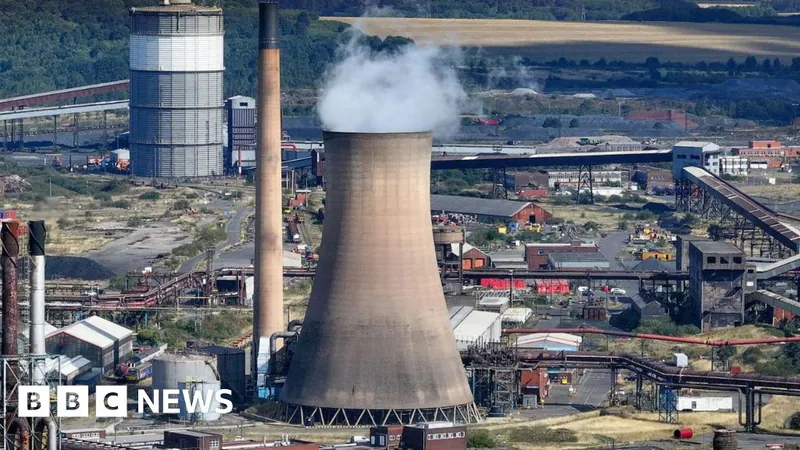
Is Nationalization the Key to Saving British Steel?
2025-04-09
Author: Kai
A Crucial Turning Point for British Steel
In a bold declaration, Culture Secretary Lisa Nandy announced that a "commercial solution" for the struggling British Steel may be just around the corner. As the government contemplates the nationalization of the Chinese-owned steel producer, Nandy emphasized the company's vital role in the UK economy, asserting it would continue to be crucial for years to come.
Urgent Challenges Ahead
With British Steel at risk of exhausting its raw materials within weeks, the future of its blast furnaces hangs in the balance. These furnaces, essential for producing high-grade steel, may face shutdowns, leading to concerns about the industry's stability.
The steel sector is grappling with a 25% tariff imposed on exports to the U.S. last month, further complicating British Steel's operations. Owned by China's Jingye since 2020, the company asserts that maintaining its two blast furnaces in Scunthorpe is no longer financially viable, despite investments exceeding £1.2 billion.
The Fine Line Between Survival and Closure
Nandy expressed her confidence in securing British Steel's future, particularly at the Scunthorpe site. However, Simon Boyd, managing director of REIDsteel—a key customer—warned that time is running out. "We have days left to secure raw materials to prevent a forced closure of the blast furnaces," he stated.
Government Support and Resistance
The government has proposed £500 million to aid the transition from blast furnaces to more energy-efficient electric arc furnaces. Yet, this plan has been met with skepticism. Electric arc furnaces, which rely on recycled steel scrap, cannot produce new "virgin steel" from iron ore and take years to become fully operational.
Boyd highlighted the superiority of Scunthorpe's current blast furnaces: "If we lose that capability, we'll rely heavily on imports, particularly from countries like China. Let's be clear: turning these furnaces back on is a costly and challenging process once they're shut down."
A Call for Nationalization
Roy Rickhuss, general secretary of the UK's largest steelworkers union, Community, backed the idea of nationalization, agreeing with Nandy that all strategies must be considered to preserve jobs.
Chancellor Rachel Reeves revealed that nationalization remains a potential option as the government actively discusses the situation with both the owners and trade unions. However, she couldn't confirm whether British Steel could secure enough raw materials in time.
Political Opinions on Steel's Future
Reform UK leader Nigel Farage echoed calls for nationalization and immediate actions to safeguard the Scunthorpe plant. He stressed that losing the ability to produce primary steel would make the UK the only major economy without it.
Conservative leader Kemi Badenoch urged for the continuation of exploring commercial routes, referencing past government interventions.
Liberal Democrat leader Sir Ed Davey pointed out that geopolitical tensions and trade tariffs pose significant threats to the steel industry, urging ministers to optimize domestic steel use in national infrastructure projects.
Meanwhile, the Green Party advocates for nationalization alongside a shift to "green steel" production.
The Clock is Ticking
With crucial decisions looming and the clock ticking, the fate of British Steel hangs in a precarious balance. Will the UK take decisive steps to safeguard this strategic industry, or will it succumb to external pressures? Only time will tell.



 Brasil (PT)
Brasil (PT)
 Canada (EN)
Canada (EN)
 Chile (ES)
Chile (ES)
 Česko (CS)
Česko (CS)
 대한민국 (KO)
대한민국 (KO)
 España (ES)
España (ES)
 France (FR)
France (FR)
 Hong Kong (EN)
Hong Kong (EN)
 Italia (IT)
Italia (IT)
 日本 (JA)
日本 (JA)
 Magyarország (HU)
Magyarország (HU)
 Norge (NO)
Norge (NO)
 Polska (PL)
Polska (PL)
 Schweiz (DE)
Schweiz (DE)
 Singapore (EN)
Singapore (EN)
 Sverige (SV)
Sverige (SV)
 Suomi (FI)
Suomi (FI)
 Türkiye (TR)
Türkiye (TR)
 الإمارات العربية المتحدة (AR)
الإمارات العربية المتحدة (AR)